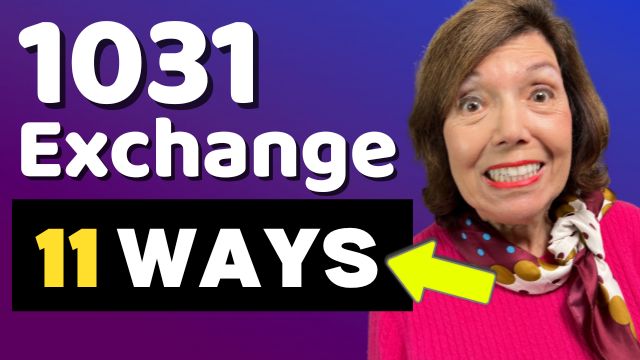Right now I’m going to show you the top 11 reasons why you would want to do a 1031 exchange. Because here’s the problem, you have a different tax situation, you have a different reason why you bought your rental property, and you have a different reason why you want to sell your rental property from any other person out there.
And real quick, a 1031 exchange is when you sell one rental property and buy another rental property using the rules and timelines the IRS has set out for you, so that you can defer your taxes, maybe forever, and help build generational wealth for you and your family.
What are the top 11 reasons people want to do a 1031 exchange?
Number one, move the rental closer to where you live, especially if you’re managing the property yourself. You may want to be able to be there to do repairs and/or keep an eye on the property.
Number two, give the kids an inheritance. By deferring the taxes you would have paid on a sale, you keep increasing the amount of the value of the inheritance. Give the kids more money because they don’t have to pay capital gains taxes if you keep deferring them.
Number three, you don’t want to be a landlord anymore. You can do several things. Hire professional management, or go into an entity called a Delaware Statutory Trust or a DST. You will get a monthly check and you don’t have to manage the property. It also qualifies under 1031 exchanges and so you can defer any taxes you would have had on the property.
Number four.
You’ve spent all your,
equity. Now how do you do that? Take a loan out on your rental and spend it. However, if you go to sell the property, there’s a taxable event. So, if you do a 1031 exchange, you can defer all the taxes to the next property.
Number five, you want a larger tax deduction. You can get that by exchanging into another property, improving the property, and perhaps have a higher basis in the property so that you can have a higher deduction.
Number six, you want to sell an inherited property. If you’ve owned it a short time, you may or may not have any tax consequences and you may or may not want to exchange. However, if you’ve owned it a long time and you’ve rented it, you definitely want to defer the capital gains.
Number 7, Get non-taxed cash. Well, you don’t have to exchange, you can borrow against it, you won’t be taxed until you sell the property, but you also may want to exchange into another property and borrow against it down the line. You need to wait a while and talk to your accountant. But you can borrow that. You also can do a partial exchange, where you’re only taxed on a certain amount – the cash that you pull out of it.
Number eight, sell co-owned property. If this is a property that you and your spouse own, or if you are in a partnership, as long as you keep the same entity. – meaning, husband and wife, LLC, a limited partnership – as long as you exchange into it with the same entity, then you can qualify under 1031.
However, if you want to dissolve the partnership in a divorce or break up the LLC, it will not qualify in the exchange.
Number nine, let’s say you want to buy a home for a relative who will live in the property. Maybe a son that goes to college or maybe a parent. If you do this, to qualify under 1031 and exchange one property for that kind of property, you must show market value rent on your taxes. Even if you’re not getting market value rent, you need to show it on your taxes, otherwise, it will not qualify. And there’s a holding period for when you sell to a relative or buy from a relative or have a relative in the property.
Number 10, to get immediate income rather than future income. An example might be if you have a vacant lot. Well that may be perfect for future income because you’ll build on it. However, it doesn’t have immediate income. So for that, you’re going to want to buy a property that’s already rented and has income, or maybe even a DST, a Delaware Statutory Trust, that will bring you immediate monthly rental income.
Number 11. Get another vacation home. Well, in general, vacation homes, if you live in them as a vacation home, do not qualify under 1031. However, if you’re living in the property less than 14 days a year, and if you are renting it out for the rest of the time, you may qualify. So, plan ahead on this one so that you have it showing on your income tax as a rental, showing your income, living in it less than 14 days a year, and then you can set up your new vacation home as a rental the same way.
Oh, and if we haven’t met, my name is Maxine Golden. I’m a long time real estate broker, and I started the 1031 Exchange Lady channel because I believe that you deserve the same tax breaks as the big investors. The law says you do, and you do. But don’t just take my word for it. Ask your accountant or ask the IRS.
They will tell you the same thing.
So, I specialize in helping rental property owners like yourself do 1031 exchanges across America. I help them myself or I refer you to agents that specialize and are experienced in 1031 exchanges. If you have any questions, write me in the comments or see below to book an appointment and we will discuss your situation.

